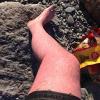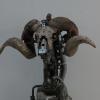Should we be concerned with the risk of contracting the human variant of mad cow disease called Creutzfeldt-Jakob disease (vCJD) by ingesting supplements that may contain gelatin that is contaminated with Bovine spongiform encephalopathy (BSE) ?
What concerns me about mad cow disease is it's long incubation period. I had read once that it was suspected that some cases of alzheimer's or dementia may actually be related to or caused by BSE, but mistaken for alzheimers or dementia.
I know that the bones of cattle are used in gelatin production. It seems to me that if bones are used, then ligaments, tendons, marrow, blood, and connective tissues will get in the mix as well. When scraps are used for gelatin production, who knows what might get in the mix. I tend to think that high risk materials would get into the mix, even if the official practice is to keep them out.
Prions can withstand a great deal of heat and are extremely hard to deactivate. I do not think that the gelatin production process would deactivate the prions if infected materials are used.
Japan tests 100% of it's beef for mad cow and Britain tests 70 percent of its beef cattle but the United States tests only a small percentage according to the center for food safety. Even China had a ban on US beef, which is really kind of scary.
Here are some links with information on Mad Cow disease and gelatin...
http://www.cdc.gov/ncidod/dvrd/bse/
http://www.aphis.usd...bse/index.shtml
http://www.centerfor...ad-cow-disease/
https://en.wikipedia..._encephalopathy
http://www.gelatin-gmia.com/
https://en.wikipedia.org/wiki/Gelatin
Please let me know what you guys think.
Thanks,
John
















































